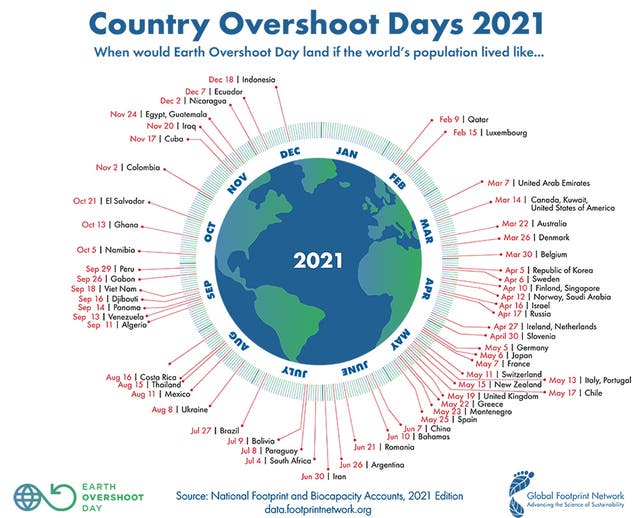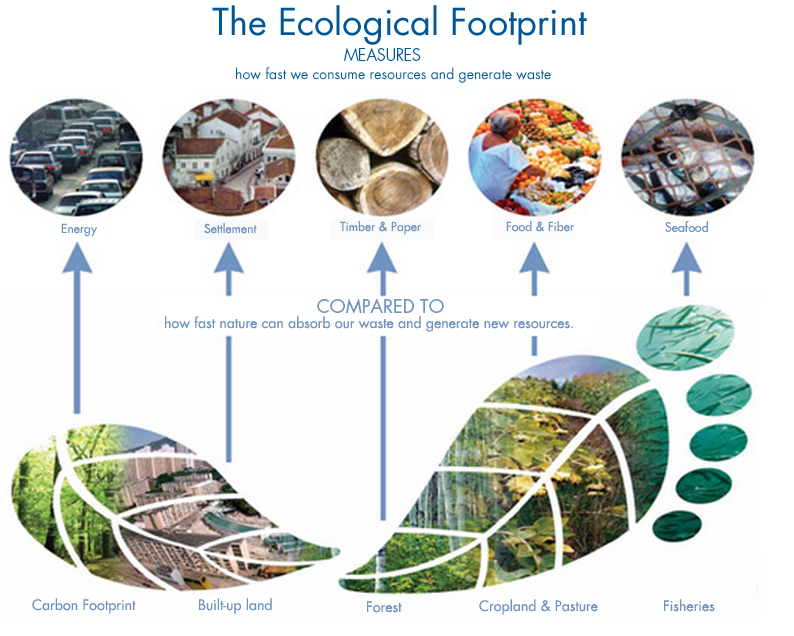Earth Overshoot Day: we're hitting it earlier ever year
Our ecological deficit has been growing since 1970. Jack Santa Barbara sets why this milestone isn't something we can continue to ignore.
One of the most significant milestones we pass each year generally goes completely unnoticed, and unacknowledged. This year it will occur on July 29. Unlike Matariki, this is not an event to celebrate, but rather one to eliminate.
This moveable milestone is Earth Overshoot Day. It is significant because it indicates when during the year humanity as a whole begins to exceed its consumption of the earth’s replenishable resources, in terms of both sources and sinks. From this day until the end of the year we will be eating into our natural capital rather than living off what that natural capital provides for us annually.
For over 40 percent of the year we are eating into the natural capital that sustains us. In the process we are reducing the natural capital available to replenish our supplies and meet our needs in subsequent years. Future generations will not be happy if this continues.

These results are confirmed by a recent UN report, Global Assessment Report on Biodiversity and Ecosystem Services, which concluded that “Nature is declining globally at rates unprecedented in human history,” and “The web of life on earth is getting smaller and increasingly frayed”. The evidence is clear that we are not simply fouling our nest, but actually destroying it. The risks are at least as serious as those of climate change.
Overshoot Day is calculated by the Global Footprint Network, the research group that developed the ecological footprint as an index of ecological sustainability. According to their calculations, humanities’ ecological footprint became unsustainable around 1970, and has been getting worse ever since.
The ecological footprint is a simple measure of how much the Earth’s natural systems produce each year, measured in terms of productive earth surface, and how much we consume, each expressed in global hectares. A “global hectare” represents the average productivity of the earth’s surface both in terms of resources and sinks – for what the earth provides in terms of food, fuel and fibre, and how natural systems absorb the waste streams we produce.
The figure below shows how humanity's ecological footprint has become increasingly unsustainable over the decades, resulting in what the researchers refer to as a biocapacity (a natural capital index) deficit. The biocapacity index indicates how much productive area, expressed as “global hectares,” is available for each person on the planet if evenly distributed (1.6 global hectares). The ecological footprint (2.8 global hectares in 2017) indicates the equivalent area the average person uses. On a global scale this results in a biocapacity deficit of 1.2 global hectares per person (the difference between nature’s production and our consumption).
This overshoot is possible because we are consuming the principal natural capital that the annual yield is derived from and depends on. It is like spending the principal of our savings account rather than just the interest it produces. The more of the principal we spend, the less interest it can provide in the future. We are already experiencing some of the consequences of this lost natural capital in terms of declining biodivesity on a global basis, as well as in New Zealand. Farmers refer to this phenomenon as “eating your seed corn”.

These data also underscore the importance of not being complacent when we transition to a lifestyle which is only less unsustainable (often misrepresented as being “sustainable” or “environmentally friendly” or “green” because it is not as bad). The critical transition is from unsustainable to genuinely sustainable. We have a way to go.
For example, we often hear that switching to EVs is “sustainable” when in reality they are simply less unsustainable than fossil fuel-driven vehicles. Switching to active and public transport, and generally reducing our need to move around, would be considerably less unsustainable, and therefore preferable. Being good ancestors is not going to be easy.
As the above figure shows, our ecological deficit has been growing since 1970. This means that each year Earth Overshoot Day has been earlier and earlier in the year. Mathis Wackernagel, CEO of Global Footprint Network and co-creator of the Ecological Footprint, says “Ultimately, moving back the date of Earth Overshoot Day on the calendar is the name of the game.”
He goes on to say that there are many opportunities to move Overshoot back toward the end of the year where it belongs.
These data demonstrate what living unsustainably means – the more unsustainable our lifestyles, and the longer we live unsustainably, the more natural capital we destroy. This underscores the importance of not only transitioning away from our unsustainable habits quickly, but of also actively regenerating the natural capital we have destroyed so far. In New Zealand we are currently compromising our natural capital/ biocapacity largely through our transportation, agriculture and forestry. Each of these areas has the potential to make great contributions to reversing the course we are on and actually increasing our biocapacity.

For example, cutting food waste by 50 percent worldwide could move the date by 11 days; reducing the carbon component of the global Ecological Footprint by 50 percent would move the date of Overshoot Day by 89 days. Getting to net zero carbon would make an even greater contribution to eliminating Overshoot Day.
While these actions and many others are available to households and businesses, there are also institutional changes that could make a big difference. The NZ Treasury, for example, admirably takes account of natural capital in its Wellbeing Framework. However, it does not actually include natural capital in its formal Statement of Accounts. So there is no official accounting of New Zealand’s natural capital that the government is required to report to us. We should be asking government to tell us how much our natural heritage is being destroyed each year in the interest of economic activities.
Nor are business balance sheets required to address the natural capital they are either using up or destroying as part of their normal business practices. The Financial Sector Climate Disclosure Bill currently before Parliament will partly address this issue in terms of greenhouse gas emissions; but it is only one step in the right direction.
Evidence from the Ecological Footprint indicates that New Zealand's natural capital has been declining for several decades. New Zealand is blessed with a large biocapacity resource (our natural capital) per capita compared to the rest of the world, but the following figure shows it is at risk of becoming a deficit before the end of this century if our consumption patterns continue as they are.
Our biocapacity (a natural capital index) has been declining over the same time frame as our population has roughly doubled. If this process continues and we end up in ecological deficit, this would have profound implications for New Zealand’s wellbeing. We would become dependent on other nations for our most basic needs. A national population policy might not be a bad idea, especially one that considers New Zealand’s carrying capacity.
It is also worth noting in the above figure that New Zealand’s average ecological footprint (4.5 global hectares) is considerably higher than the global average (2.8 global hectares), as well as higher than what would be sustainable (1.6 global hectares; all data from 2016 or 2017).
So we remain a long way from living sustainably in this country, and in most other developed nations. This is the case despite clear evidence from the ecological footprint methodology as above, as well as from an NZ-focused study of planetary boundaries, and other measures.
Many of the recommendations made by our Climate Change Commission would go a long way to making us less unsustainable, as well as mitigate the damages of climate change. The overwhelming of nature’s capacity to absorb greenhouse gas emissions by our current practices constitute a large portion of our ecological footprint. So moving to carbon neutral as fast as possible will not only save us from the worst ravages of climate chaos, but also move us toward a genuinely sustainable lifestyle.
So let's do our part, and continue reminding governments at all levels that these matter are serious and we support action to not only move Earth Overshoot Day closer to December 31, but to make it history.
You can determine your personal overshoot day with this calculator. Make it disappear!
Jack Santa Barbara, a retired CEO, lecturer in Sustainable Business, author and climate activist, is a member of the Our Climate Declaration core group. This story was first published by Newsroom on 27 July 2021.
Featured News
See all news >Newsletter April 2024 - Can you help?
16 April 2024
Ngā mihi nui! Our Climate Declaration needs a new convenor Can you help? We are now in our s...
Read more >

A new way to fund climate action? | Webinar Recording
12 April 2024
Tēnā koutou katoa! This webinar picked up important threads from our previous webinar - on b...
Read more >

Building Alternatives: Are Efforts to Reform the System Misplaced? | Webinar Recording
11 April 2024
We were pleased to co-sponsor this webinar. Ted Trainer Ph.D. is a retired Australian academ...
Read more >

A Degrowth Approach to Climate Change | Webinar Recording
29 March 2024
We were proud to present this webinar, along with the Nelson Tasman Climate Forum:
Read more >

The Behavioural Crisis Driving Ecological Overshoot (2nd Presentation) | Webinar Recording
08 March 2024
We decided to open this year’s webinar series with a second presentation of last year’s “The...
Read more >
Newsletter February 2024
14 February 2024
Kia ora katoa! Ngā mihi nui mō enei rā mahana rawa! We decided to open this year’s webinar s...
Read more >
Newsletter January 2024
28 January 2024
Tēnā koutou katoa. Ngā mihi nui mō tēnei tau hou. Another year and a new government – and he...
Read more >

When the heat rises, we all suffer | Newsroom
15 January 2024
Credit Matthias Zomer on Pexels for thumbnail
Read more >

Take the Jump | Webinar Recording
07 December 2023
We ended 2023 with our final webinar of the year, on Wednesday 6th December: Take the Jump ...
Read more >
Newsletter November 2023
24 November 2023
Kia ora katoa! This newsletter focuses on activities undertaken in local communities for the...
Read more >

